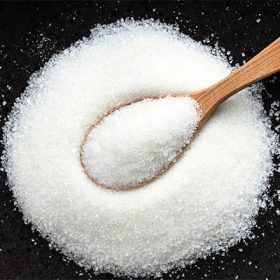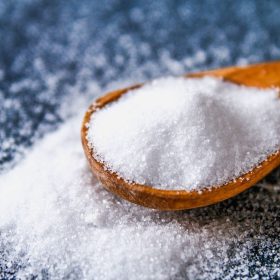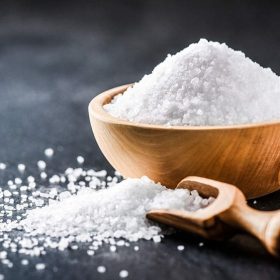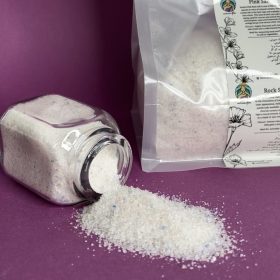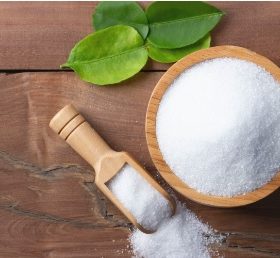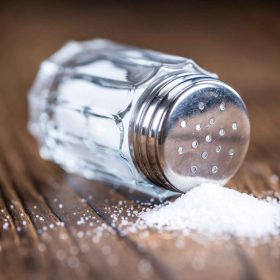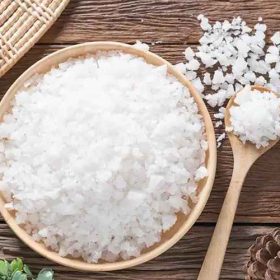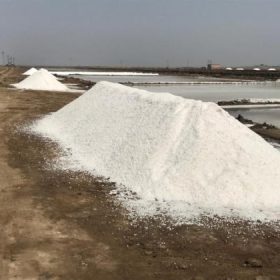
Product information and guide
Iranian Salt
Salt is one of the basic ingredients in cooking and preserving food. In Iran, salt has long been an important economic and nutritional element and has a tremendous impact on the country’s food culture and traditions. This article examines the various aspects of Iranian salt, its types, benefits and harms, characteristics of quality salt, main producers and storage tips.
Iranian Salt and Its Types
Salt, as a mineral, exists in nature in various forms, and Iran is one of the countries with a rich source of natural salt. Some types of Iranian salts include sea salt, rock salt and shell salt. Sea salt is obtained by evaporating seawater and generally contains more minerals than other types of salt. This type of salt is produced in the coastal areas of the country, especially in the north and south of the country, and is popular among chefs and consumers due to its special taste and quality.
Rock salt, which is usually extracted from salt mines, is one of the important sources of salt in Iran. This type of salt is usually found in mountainous areas and natural salt flats and has special mineral properties due to the lack of much processing. Shell salt is also obtained from the evaporation of salty sea water and shell deposits, which are often found in abundance in the southern coastal areas of Iran, such as Bushehr.
In comparison, sea salt is superior to rock salt in terms of taste and minerals, while rock salt is more suitable for industrial and commercial uses due to its extraction process and purity. Similarly, shell salt is excellent for certain uses such as preparing seafood and seasonings due to its moisture-absorbing properties.
When it comes to the points to consider when choosing salt, paying attention to the quality and processing of salts is of particular importance. Unrefined, naturally produced salts tend to have a better taste and texture, and consumers are looking for such salts to not only enjoy a richer taste, but also to benefit from more mineral properties and to choose healthier options for nutrition.
Benefits of consuming salt
As an essential element in our diet, salt plays a vital role in maintaining health. This mineral helps regulate blood pressure, transmit nerve signals, and maintain the balance of body fluids. Adequate salt intake can help prevent electrolyte disorders and maintain normal cell function. For people who are very physically active, salt, as the main source of sodium, is considered an infrastructure for restoring electrolytes and maintaining energy.
In addition, salt can help increase appetite and play an important role in flavoring foods. Since ancient times, salt has been used as one of the main seasonings in foods, and without it, many foods become tasteless and inedible. Considering the Iranian food culture, which includes diverse and spicy foods, salt consumption is essential in creating a balance of flavors in foods.
Disadvantages of Excessive Salt Consumption
Despite its many benefits, excessive salt consumption can have irreparable consequences. One of the most important problems caused by excessive salt consumption is increased blood pressure, which in turn can increase the risk of cardiovascular diseases. Studies have shown that people who regularly consume more than the recommended amount of salt may face more serious problems such as stroke and kidney disease in the long term.
In addition, excessive salt consumption can cause allergies and digestive disorders. In some people, this increased consumption can lead to symptoms of discomfort such as bloating, swelling and even excess water retention, which can lead to other problems in the future. Therefore, controlling salt intake is of particular importance and it is recommended that people carefully monitor the amount of salt they consume in their diet.
What are the characteristics of quality salt?
Quality salt should have several distinct characteristics. The first characteristic is purity and the absence of impurities. High-quality salts should be free of impurities such as chemicals and soil. This is especially important in sea and shell salts, which should be well refined and processed. To ensure quality, the best way is to buy salt from reputable and well-known sources.
The second characteristic is the taste and texture of the salt. High-quality salt should have a balanced and pleasant taste and retain its unique aroma and flavor after dissolving in water or when consumed in food. Also, the texture of the salt should not be too fine or coarse, but should have standards such as uniform grains to make it easier to use.
Which provinces in Iran are the largest producers of salt?
With its rich salt resources, Iran is known as one of the largest salt producers in the world. Among the major salt-producing provinces are Semnan, Kerman, and Gilan. Semnan province is especially famous as a center for the production of mineral and rock salts, and the salts produced in this province are well known in the market due to their high quality and unique characteristics.
Kerman province is also considered another important center for salt production due to its vast salt mines and suitable geographical conditions. At the same time, Gilan province produces high-quality sea salts due to the presence of the sea and rich water resources. This geographical diversity and rich resources have increased the production and supply of salt in these provinces and play an important role in meeting domestic needs and exporting to other countries.
The best way to store salt at home
Proper storage of salt at home is vital to maintain its quality and taste. The best way to store salt is to use dry, sealed containers that prevent moisture from entering it. Glass or plastic containers that are completely dry are the best option for storing salt. Salt should not be stored in humid places or exposed to direct sunlight, as this can damage its quality.
Also, when choosing a place to store salt, it should be noted that the temperature should be balanced so that it is not affected by atmospheric and temperature changes. Placing salt in cabinets away from direct heat and in a well-ventilated place can help maintain its quality. These things not only prevent salt from spoiling, but also make the salt stay fresh and usable for a longer period of time.
Benefits and economic justification of bulk salt purchases for stores
Bundle salt purchases for stores are very justified for economic and resource management reasons. By purchasing in bulk, stores will be able to reduce purchasing costs, which can help increase profit margins. Bulk purchasing also allows stores to manage their inventory optimally and respond to customer needs over time.
On the other hand, a continuous supply of high-quality salt in large quantities can help stabilize the price and supply of this product in the market. This not only helps maintain the store’s reputation, but also increases customer loyalty. Thus, bulk purchasing of salt is a smart strategy to increase competitiveness and meet the needs of customers’ daily lives.
Conclusion
Salt is not only a major seasoning in foods, but also plays an important role in diet and improving general health. This article discusses the benefits of consuming salt, its different types, and important characteristics of quality salt. It also highlights the importance of recognizing and choosing the right salt for daily life by examining the main producing provinces and proper storage methods. Paying attention to these points and consuming salt sensibly can help improve the quality of life and health of individuals.
To read the full text of Ehsan Baghban's business introduction letter, click on the button below.
To read the full text of "Why You Should Choose Ehsan Baghban Trading", click on the button below.
Buy in bulk
The following product is only available in bulk. Click on this area for more information!
Terms of purchase of this product
To purchase this product in bulk, please contact us.
There are ways to contact us at the bottom of this page.
To read the full text of our cooperation proposal, click on the button below.
Ways to contact us and get advice
If you need advice, contact us at one of the following numbers:
1449
With Iran prefix +98
9122002000
With Iran prefix +98
9125000500
With Iran prefix +98
9126006000
With Iran prefix +98
Contact us
If you need to contact us via the online form, click on the button below.
Contact Us Form


